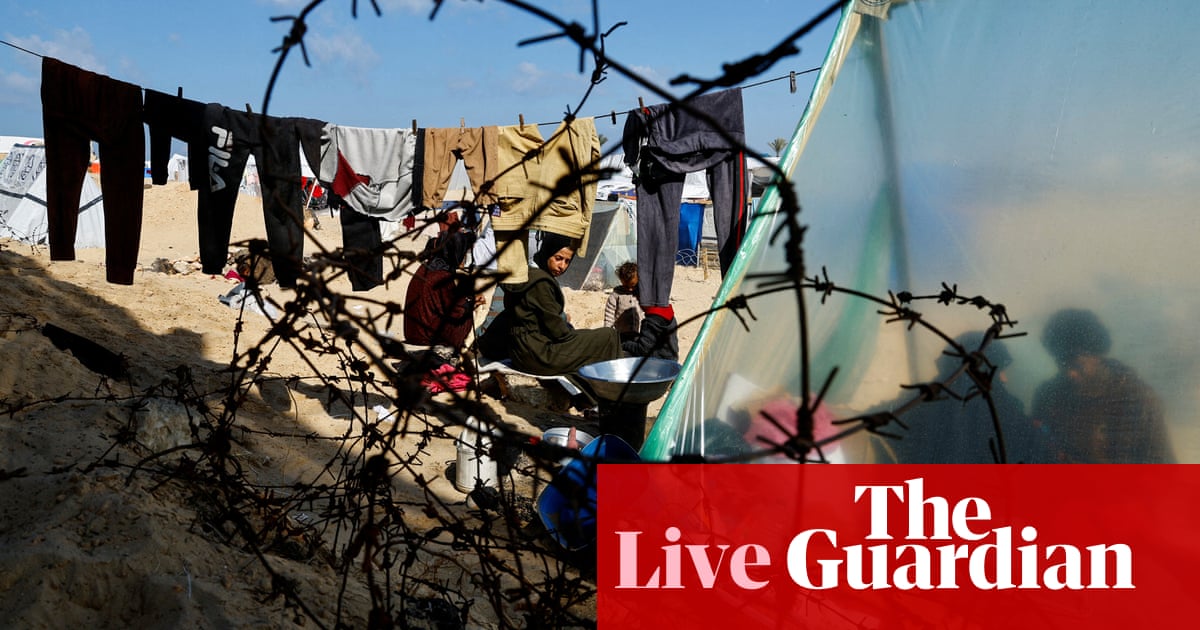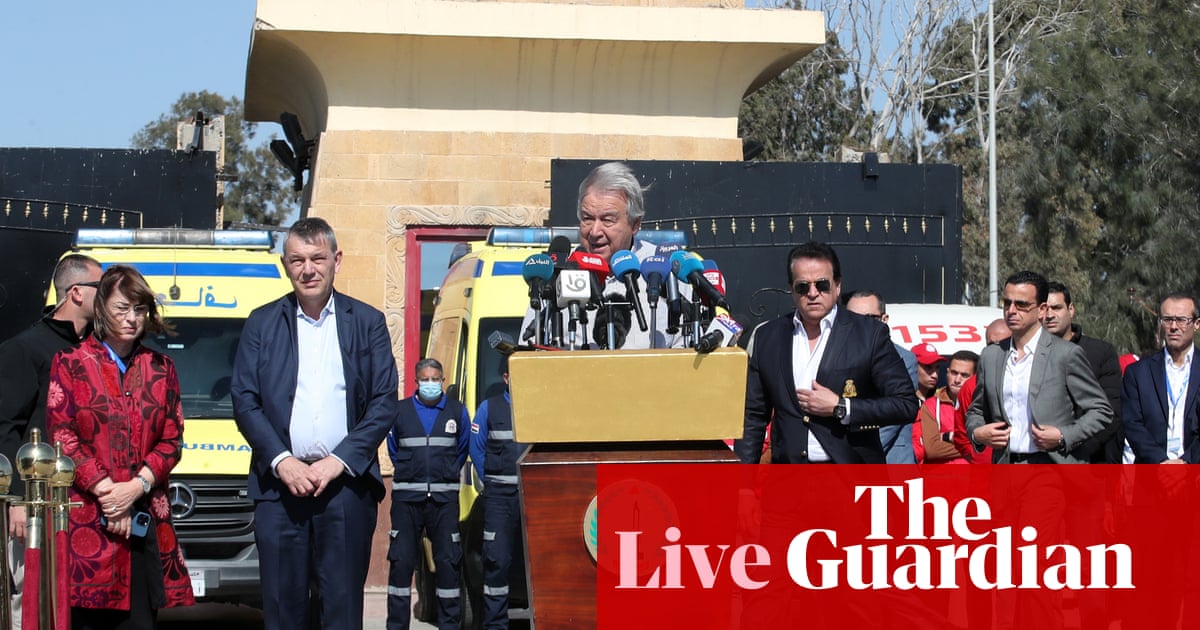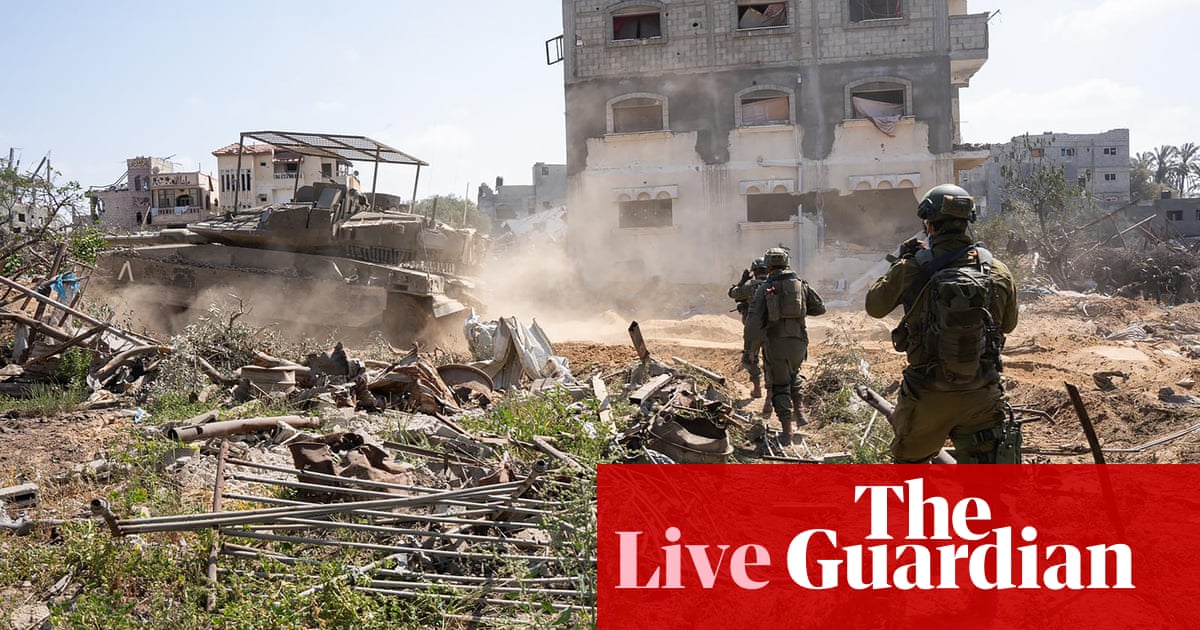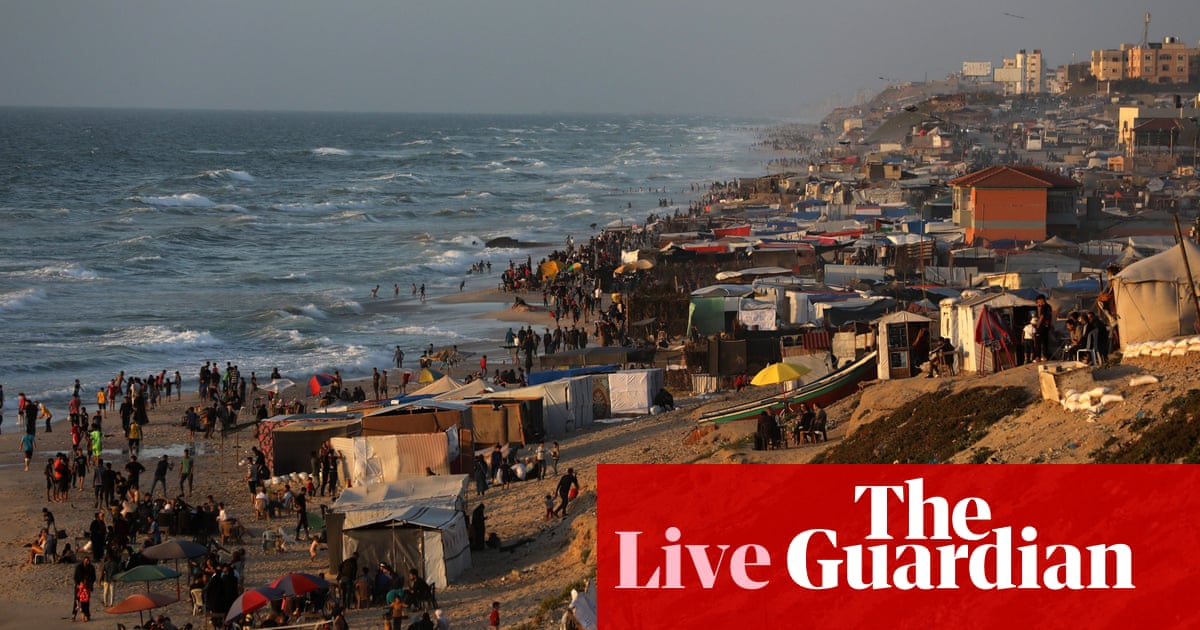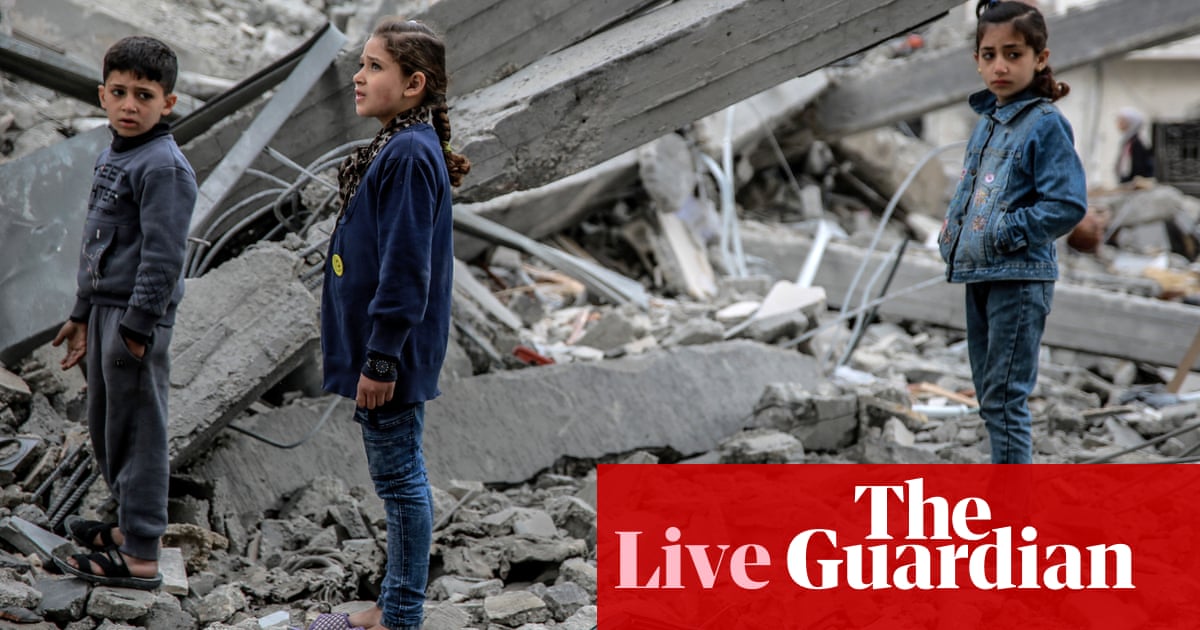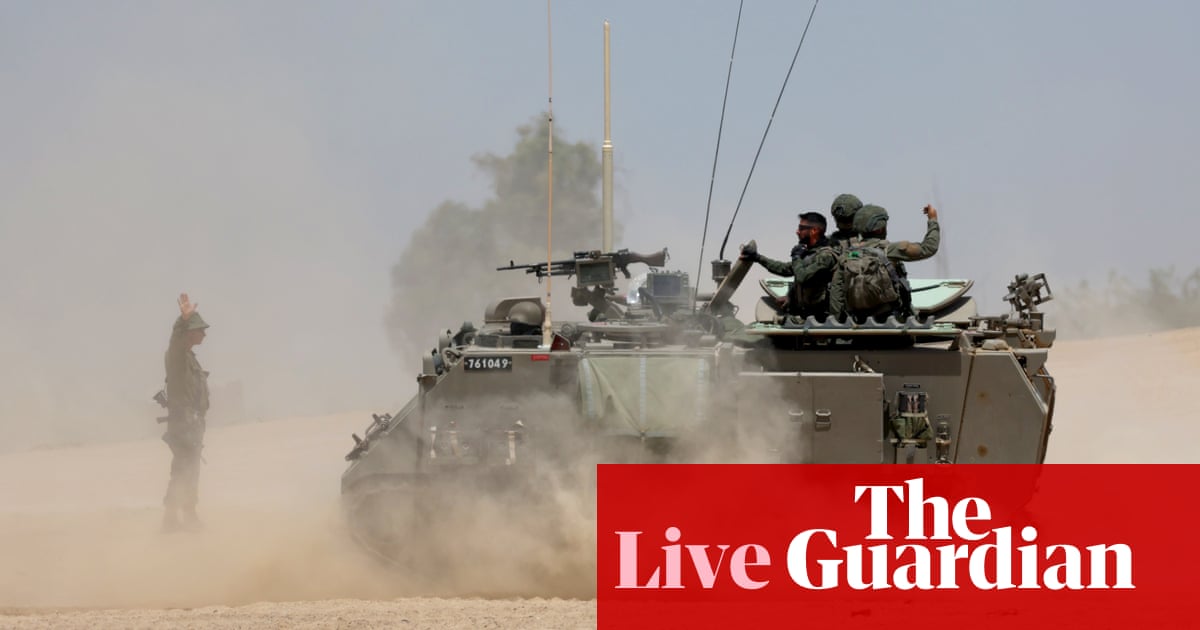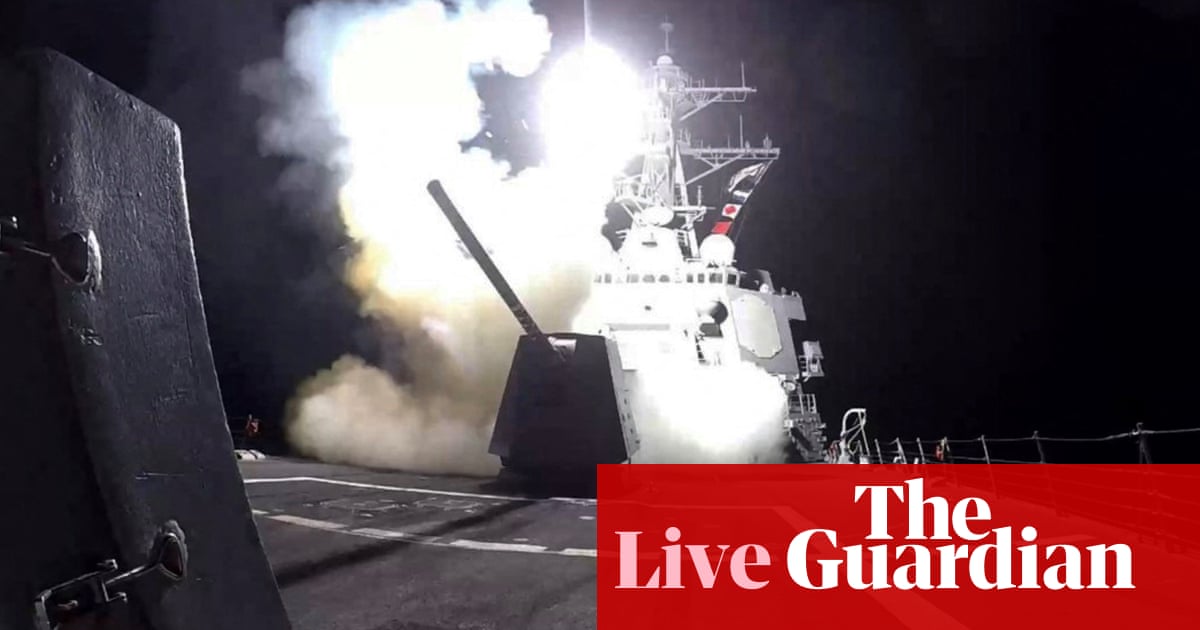
US plans more strikes in Middle East against Iran-backed groups - national security adviser
The US national security adviser, Jake Sullivan, said there would be more steps in the American response to the Jordan drone attack that killed three soldiers last weekend.
Speaking to NBC’s Meet the Press, Sullivan was quoted as saying:
We intend to take additional strikes, and additional action, to continue to send a clear message that the United States will respond when our forces are attacked, when our people are killed.
“What happened on Friday was the beginning, not the end, of our response, and there will be more steps – some seen, some perhaps unseen,” Sullivan told CBS’s Face the Nation. “I would not describe it as some open-ended military campaign,” he added.
The comments come after an air assault by the US in Iraq and Syria on Friday that attacked more than 80 targets on sites belonging to Iran-linked militias and Tehran’s Revolutionary Guard.
We are now closing the live blog. Here is a summary of events today:
Antony Blinken, the US secretary of state, was due to arrive in the region on Sunday. He is expected to spend the week visiting Saudi Arabia, Egypt, Qatar, Israel and the West Bank, to discuss efforts to reach a deal to secure the freedom of at least 136 remaining hostages in Gaza, and a ceasefire intended to calm regional tensions particularly in the Red Sea. The White House national security adviser, Jake Sullivan, said humanitarian issues in Gaza would be a top priority for Blinken during the trip.
Separately, Jake Sullivan said there would be more steps in the American response to the Jordan drone attack that killed three soldiers last weekend. Speaking to NBC’s Meet the Press, he was quoted as saying: “We intend to take additional strikes, and additional action, to continue to send a clear message that the United States will respond when our forces are attacked, when our people are killed.” “What happened on Friday was the beginning, not the end, of our response, and there will be more steps – some seen, some perhaps unseen,” Sullivan told CBS’s Face the Nation. “I would not describe it as some open-ended military campaign,” he added.
Israel’s national security minister, Itamar Ben-Gvir, told the Wall Street Journal that the US president, Joe Biden, had not given Israel sufficient support to its war in Gaza. “Instead of giving us his full backing, Biden is busy with giving humanitarian aid and fuel (to Gaza), which goes to Hamas,” Ben-Gvir told the newspaper in an article published on Sunday. “If (former US president Donald) Trump was in power, the US conduct would be completely different.”
France’s foreign minister, Stéphane Séjourné said he rejects the “forced displacement” of Palestinians into Egypt from the Gaza Strip, where Israeli bombardment has pushed hundreds of thousands against the border, AFP reports.
Israel’s army said on Sunday its forces had raided a Hamas training facility in Gaza where militants prepared for the 7 October attack on Israel. The facility in the Palestinian territory’s main southern city of Khan Younis contained models of Israeli military bases, armoured vehicles, as well as entry points to kibbutzim, the army said in a statement. Soldiers also raided the office of Mohammad Sinwar, a senior commander in Hamas’s armed wing, the Ezzedine al-Qassam Brigades, it added.
There has been reaction to the strikes launched by US and Britain late on Saturday. The two nations launched strikes against 36 Houthi targets in Yemen, hitting buried weapons storage facilities, missile systems, launchers and other capabilities the Houthis have used to attack Red Sea shipping, the Pentagon said. These attacks are “in clear contradiction with the repeated claims of Washington and London that they do not want the expansion of war and conflict in the region,” Iran’s foreign ministry spokesperson, Nasser Kanani, said in a statement. Hamas warned the attacks would bring “further turmoil” to the Middle East. The Palestinian militant group called the bombing of Houthi rebel targets “a blatant assault on the sovereignty of a sister Arab country, and an escalation that will drag the region into further turmoil”. David Cameron, the UK’s foreign secretary, posted to X on Sunday morning that the Houthi attacks on international shipping “must stop”, saying “their reckless actions are putting innocent lives at risk”.
The head of Iraq’s pro-Iran Hashed al-Shaabi alliance demanded the withdrawal of US-led coalition forces from the country after deadly strikes, AFP reported. “They targeted administration offices, a (Hashed) hospital, they struck forces tasked with protecting the borders,” Faleh al-Fayyad said at a funeral ceremony for members of the group killed in the US strikes. “Targeting the Hashed al-Shaabi is playing with fire,” he warned. On Friday, US strikes in the west of Iraq struck positions staffed by pro-Iran groups, in response to an attack in January on a base in Jordan that killed three US soldiers.
A total of 27,365 Palestinians have been killed and 66,630 have been injured in Israeli strikes on Gaza since 7 October, the Gaza health ministry said. An estimated 127 Palestinian people were killed and 178 injured in the past 24 hours, the ministry added.
A 30-year-old Arab-Israeli woman married to a Palestinian from the Gaza Strip has recalled how she fled Israel’s bombardment of the territory with her 18-month-old and four-year-old children, terrified they would run out of fuel.
“We feared that the gas wouldn’t be enough,” she told AFP. “The road was deserted. All the way along, we saw devastated houses.”
Fatima, who was speaking under a pseudonym, left on the “very perilous” journey from al-Qarara in southern Gaza to the Rafah crossing with Egypt on 14 November.
She initially hesitated to leave her husband, but he encouraged her to go to protect their children.
After hours of waiting, a bus took them across the Sinai desert to the Egyptian town of Taba, before reaching Eilat, on Israel’s Red Sea coast.
The 48-hour trip was organised by the Israeli human rights organisations Gisha and HaMoked, which have evacuated 71 Arab Israelis so far.
She described a journey filled with anxiety and under bombardment. Once in Eilat, she and everyone else over the age of 16 spent hours being questioned and searched.
Fatima said she was interrogated about her relatives, the situation in the Gaza Strip and whether she knew anything about Hamas tunnels and headquarters in the territory.
“They questioned me about my view on 7 October, about my husband and his work,” she said. “They ordered me to open my phone to examine my photos, calls and messages.”
In Gaza, Fatima said she had endured “electricity cuts, water cuts and deserted businesses”.
She survived “36 days thanks to canned food and drinking salty water. The solar panels were barely enough to charge the phones.”
Fatima is now living in an Arab town in Israel, but said it was difficult starting a new life, with her children “scared by the sound of every plane or thunder”.
Israel’s army said on Sunday its forces had raided a Hamas training facility in Gaza where militants prepared for the 7 October attack on Israel.
The facility in the Palestinian territory’s main southern city of Khan Younis contained models of Israeli military bases, armoured vehicles, as well as entry points to kibbutzim, the army said in a statement.
Soldiers also raided the office of Mohammad Sinwar, a senior commander in Hamas’s armed wing, the Ezzedine al-Qassam Brigades, it added.
He is also the brother of Yahya Sinwar, the head of Hamas in Gaza who is believed to be the mastermind behind the October 7 attack.
During the raid on the al-Qadisiya compound in Khan Younis, the forces encountered several militants who fired at them, the army said.
The militants were “neutralised” by sniper fire, tank shelling and air strikes, it added.
Here are some images coming to us over the wires:
Canada will impose sanctions on Israeli settlers who incite violence in the West Bank and will introduce new sanctions on Hamas leaders, the foreign minister, Melanie Joly, said on Sunday, after the US took similar action last week.
In an interview with the Canadian Broadcasting Corp on Sunday, Joly, who has been in Ukraine, said some settlers “will be sanctioned” and “we will also bring new sanctions on Hamas leaders”.
She added:
We’re working actively on it. I’m making sure that while I’m in Ukraine, the work is being done in Ottawa and I look forward to doing an announcement soon.
Canada’s prime minister, Justin Trudeau, on Friday said he was considering imposing sanctions on “extremist” settlers in the West Bank, Reuters reports.
France’s foreign minister, Stéphane Séjourné, said he rejected the “forced displacement” of Palestinians into Egypt from the Gaza Strip, where Israeli bombardment has pushed hundreds of thousands towards the border, AFP reports.
At the start of his Middle East tour, (see earlier at 13.56) Séjourné addressed his Egyptian counterpart, Sameh Shoukry, in a joint press conference, acknowledging Cairo’s concern about the issue.
“We perfectly understand these concerns, and on this point, France’s position remains the same: we condemn and will reject any action taken in this direction,” he said.
Asked about France’s plans to recognise a Palestinian state, the minister said the step would mark “the finalisation of a political process”.
That process, he said, “must lead to this, that’s the logic”.
“The whole question is when, at what moment and under what conditions,” he continued, adding that Gaza would be “attached to the future Palestinian state”.
Continued US-UK aggression in Yemen will not affect Yemen’s decision to show its support for Gaza, Houthi spokesperson Mohammed Abdulsalam said in a statement, after a third wave of US and UK strikes hit 36 Houthi targets in Yemen on Saturday night.
Abdulsalam added that it will not be easy to destroy Yemeni military capabilities, Reuters reports.
The Iran-backed militant group has repeatedly launched attacks on vessels in the Red Sea and elsewhere off the Yemen coast, claiming it is targeting Israeli or Israel-destined ships in protest over Israel’s war in Gaza.
However, it has frequently targeted ships with tenuous or no clear links to Israel.
Summary of the day so far...
Antony Blinken, the US secretary of state, was due to arrive in the region on Sunday. He is expected to spend the week visiting Saudi Arabia, Egypt, Qatar, Israel and the West Bank, to discuss efforts to reach a deal to secure the freedom of at least 136 remaining hostages in Gaza, and a ceasefire intended to calm regional tensions particularly in the Red Sea. The White House national security adviser, Jake Sullivan, said humanitarian issues in Gaza would be a top priority for Blinken during the trip.
Separately, Jake Sullivan said there would be more steps in the American response to the Jordan drone attack that killed three soldiers last weekend. Speaking to NBC’s Meet the Press, he was quoted as saying: “We intend to take additional strikes, and additional action, to continue to send a clear message that the United States will respond when our forces are attacked, when our people are killed.” “What happened on Friday was the beginning, not the end, of our response, and there will be more steps – some seen, some perhaps unseen,” Sullivan told CBS’s Face the Nation. “I would not describe it as some open-ended military campaign,” he added.
Israel’s national security minister, Itamar Ben-Gvir, told the Wall Street Journal that the US president, Joe Biden, had not given Israel sufficient support to its war in Gaza. “Instead of giving us his full backing, Biden is busy with giving humanitarian aid and fuel (to Gaza), which goes to Hamas,” Ben-Gvir told the newspaper in an article published on Sunday. “If Trump was in power, the US conduct would be completely different.”
The US and Britain have launched strikes against 36 Houthi targets in Yemen, in the second day of major US operations against Iran-linked groups after a deadly attack on American troops last weekend. The strikes late on Saturday hit buried weapons storage facilities, missile systems, launchers and other capabilities the Houthis have used to attack Red Sea shipping, the Pentagon said. These attacks are “in clear contradiction with the repeated claims of Washington and London that they do not want the expansion of war and conflict in the region,” Iran’s foreign ministry spokesperson, Nasser Kanani, said in a statement. Hamas warned the attacks would bring “further turmoil” to the Middle East. The Palestinian militant group called the bombing of Houthi rebel targets “a blatant assault on the sovereignty of a sister Arab country, and an escalation that will drag the region into further turmoil”. David Cameron, the UK’s foreign secretary, posted to X on Sunday morning that the Houthi attacks on international shipping “must stop”, saying “their reckless actions are putting innocent lives at risk”.
The head of Iraq’s pro-Iran Hashed al-Shaabi alliance demanded the withdrawal of US-led coalition forces from the country after deadly strikes, AFP reported. “They targeted administration offices, a (Hashed) hospital, they struck forces tasked with protecting the borders,” Faleh al-Fayyad said at a funeral ceremony for members of the group killed in the US strikes. “Targeting the Hashed al-Shaabi is playing with fire,” he warned. On Friday, US strikes in the west of Iraq struck positions staffed by pro-Iran groups, in response to an attack in January on a base in Jordan that killed three US soldiers.
A total of 27,365 Palestinians have been killed and 66,630 have been injured in Israeli strikes on Gaza since 7 October, the Gaza health ministry said. An estimated 127 Palestinian people were killed and 178 injured in the past 24 hours, the ministry added.
US plans more strikes in Middle East against Iran-backed groups - national security adviser
The US national security adviser, Jake Sullivan, said there would be more steps in the American response to the Jordan drone attack that killed three soldiers last weekend.
Speaking to NBC’s Meet the Press, Sullivan was quoted as saying:
We intend to take additional strikes, and additional action, to continue to send a clear message that the United States will respond when our forces are attacked, when our people are killed.
“What happened on Friday was the beginning, not the end, of our response, and there will be more steps – some seen, some perhaps unseen,” Sullivan told CBS’s Face the Nation. “I would not describe it as some open-ended military campaign,” he added.
The comments come after an air assault by the US in Iraq and Syria on Friday that attacked more than 80 targets on sites belonging to Iran-linked militias and Tehran’s Revolutionary Guard.
Humanitarian issues in Gaza will be a top priority for the US secretary of state, Antony Blinken, on his trip to the region, the White House national security adviser, Jake Sullivan, said.
Blinken is expected to spend the week visiting Saudi Arabia, Egypt, Qatar, Israel and the West Bank, to discuss efforts to reach a deal to secure the freedom of at least 136 remaining hostages in Gaza, and a ceasefire intended to calm regional tensions particularly in the Red Sea.
His French counterpart, Stéphane Séjourné, has travelled to Egypt (see earlier post at 13.56 for more details).
“The needs of the Palestinian people are something that are going to be front and centre,” Sullivan told CBS’s Face the Nation.
The overwhelming majority of Gaza’s 2.3 million people are displaced, according to the UN’s Office for Humanitarian Affairs (Ocha), with more than half the territory’s population now crowding into makeshift camps and on to the streets of Rafah city.
The US believed it was vital to secure a deal to release the remaining hostages Hamas took during its attack, including American hostages, and an accompanying humanitarian pause, Sullivan added.
“This is in the national security interest of the United States. We are going to press for it relentlessly,” Sullivan said. “So this is a paramount priority for us.”
The ball was in Hamas’s court when it came to such a deal, Sullivan said, noting that the Israelis had put forth a proposal.




